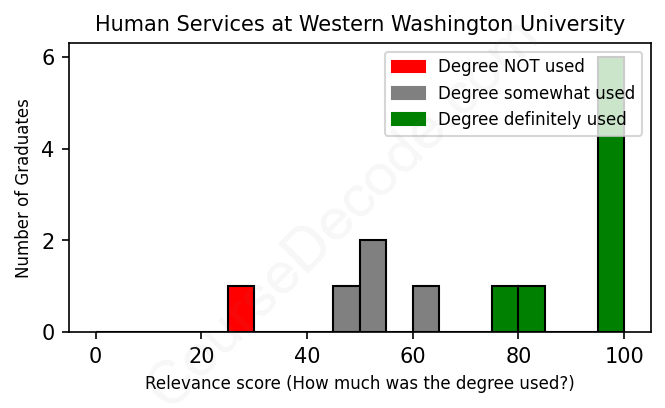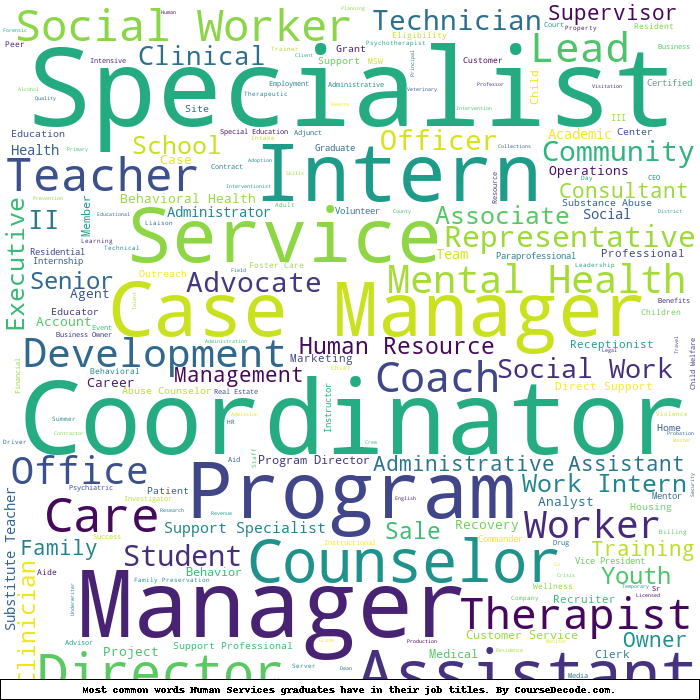
First, some facts. Of the Human Services graduates from Western Washington University we've analyzed , here's how many have used (or NOT used) their degree in their career:

These are estimates based on AI analysis of 13 LinkedIn profiles (see below).
The verdict? Significantly above average. Overall, with an average relevance score of 78%, Human Services graduates from Western Washington University have a much higher likelihood (+11%) of finding work in this field compared to the average graduate across all fields:
And for comparison, here's the chart for all profiles we've looked at across all degrees.
Also, after graduating, 35% of these graduates have pursued further education other than another Bachelor's degree (such as a Masters degree or other), which is right in line with the average across all fields.
See the details:
|
Relevance score: 100% We think this person has gone into a career highly relevant to their degree. We think this person has gone into a career highly relevant to their degree.
DEGREE INFOGraduated in 2010 from Western Washington University with a Bachelor of Arts - BA in Human Services. No other secondary education since. JOB HISTORY SINCE GRADUATIONFacilities Manager Domestic Violence Services of Snohomish County Mar 2012 - Feb 2018 Victim Advocate Specialist/volunteer coordinator  Providence Feb 2018 - Present Lead Patient Advocate and Volunteer Coordinator  Providence Intervention Center Mar 2022 - Present ABOUTOver 12 years experience in the human services field- Facilities management of emergency Domestic Violence shelter, Volunteer Coordination, Victim Advocacy, Community Outreach, Training Facilitator, Community Education, Legal advocacy - Committed to helping individuals, families and communities affected by abuse and assault. |
The top 10 most common jobs done by the graduates we've analyzed (ranked most common to least) are:
When looking at the jobs people with a Human Services degree from Western Washington University have gone into, a few common trends pop up. A lot of these grads end up in positions like case managers, victim advocates, and various roles in organizations geared toward helping vulnerable populations, which are totally in line with the skills they learned in their degree programs. For instance, roles like “Victim Advocate Specialist” and “Case Manager” are prime examples of jobs that directly tap into their education by requiring them to provide support, advocate for individuals, and understand the complexities of human behavior. Positions in nonprofits or social services like these reflect a strong connection to their Human Services background.
On the flip side, there are also quite a few roles that seem more like detours from the Human Services track. Some grads find themselves in administrative or customer service jobs where the relevance to their degree is pretty slim. For example, jobs like Administrative Specialist or Marketing Assistant don’t really utilize the core skills from their Human Services training, showing that not every path taken after graduation directly reflects their education. Overall, while many have stepped into impactful roles that align with their degree, there’s a noticeable chunk of graduates who have taken on jobs that don’t fully engage with the principles of Human Services, showcasing a mix of both alignment and deviation from their studies.
Here is a visual representation of the most common words in job titles for Human Services graduates (this is across all Human Services graduates we've analyzed, not just those who went to Western Washington University):

When looking at the career paths of graduates in Human Services from Western Washington University, there’s a pretty clear trend toward positions that are directly related to helping others, especially in the early stages of their careers. Many of the graduates seem to start off with roles in advocacy, case management, or support services—like victim advocacy or as a case manager in various organizations. This emphasis on practical experience in the human services field reflects a common trajectory where fresh grads often dive into roles where they can make a direct impact on individuals and communities, which is really encouraging for someone considering this field.
As these graduates progress five or ten years into their careers, their roles often become more specialized or leadership oriented. For instance, many have transitioned from entry-level positions to more advanced roles such as social workers, program coordinators, or even executive directors. This indicates a solid opportunity for growth in the field, which is a great sign for anyone worried about job stability or advancement. However, there are also cases where some alumni shifted into less related fields, such as customer support or administration, which might not utilize their degree as effectively. Overall, it appears that the majority of these graduates are carving out successful careers that are quite relevant to human services, supporting the notion that pursuing a degree in this area can lead to fulfilling and impactful work.
Getting a Bachelor’s degree in Human Services at Western Washington University is generally on the easier side compared to some other majors, but it still has its challenges. You'll cover a lot of interesting topics, especially around social issues and community services, and you'll probably do some hands-on work through internships or projects. The coursework can be manageable, but you’ll need to stay organized and keep up with readings and assignments. If you enjoy helping people and are passionate about social issues, you'll find it pretty rewarding, but like any degree, it still requires dedication and effort to get through!
Most commonly, in the LinkedIn profiles we've looked at, it takes people 2 years to finish a Bachelor degree in Human Services.
Looking at these graduates from Western Washington University, it seems like their earnings might not be super high, especially compared to some other fields. Many of them started in positions that are pretty typical for human services—like case managers and advocates—where salaries tend to be on the lower side. Jobs like facilities manager or administrative roles can pay decently, but based on their career paths, it looks like most are sticking with more service-focused roles that often come with smaller paychecks. While they’re definitely doing important work, it's kind of a mixed bag when it comes to making "decent money." It really depends on the specific roles and organizations they end up with, but overall, I wouldn’t say they’re rolling in cash!
Here is a visual representation of the most common words seen in the "about" section of LinkedIn profiles who have a Bachelor degree in Human Services (this is across all Human Services graduates we've analyzed, not just those who went to Western Washington University). This may or may not be useful:

Here are all colleges offering a Bachelor degree in Human Services (ordered by the average relevance score of their Human Services graduates, best to worst) where we have analyzed at least 10 of their graduates:
| College | Score | Count |
|---|---|---|
 Old Dominion University Old Dominion University
|
82 | 32 |
 Springfield College Springfield College
|
82 | 16 |
 California State University, Fullerton California State University, Fullerton
|
80 | 16 |
 Western Washington University Western Washington University
|
78 | 13 |
 Columbia College Columbia College
|
77 | 13 |
 Southern New Hampshire University Southern New Hampshire University
|
60 | 11 |
 University of Phoenix University of Phoenix
|
59 | 57 |